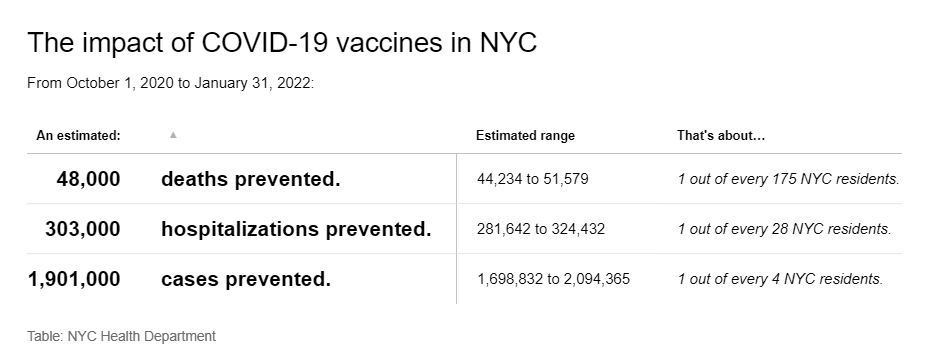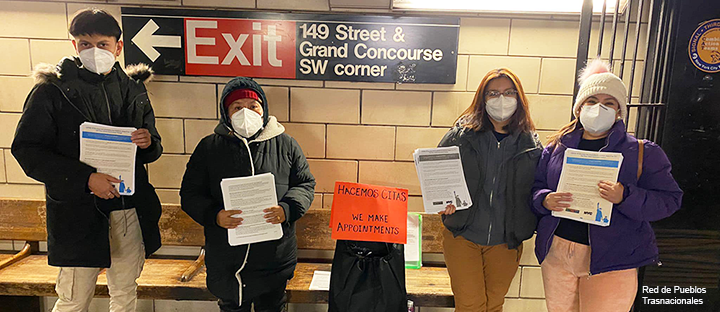As NYC Health Commissioner and FPHNYC Board Chair Dr. Dave A. Chokshi prepares to step down from these positions in mid-March, he and FPHNYC Executive Director Sara Gardner reflect on a successful recent public health initiative made possible by public, private, and philanthropic support.
To get COVID-19 vaccination and booster shots in more arms this winter, members of Red de Pueblos Trasnacionales (RPT) have spent hundreds of hours doing outreach inside Bronx subway stations. In the gaps between the noisy arrival and departure of trains, RPT’s volunteers answer people’s questions and provide reliable information about COVID-19 vaccinations in Quechua, Me’phaa, and the Mixtec languages of South America. Their frequent presence at subway stations is part of an initiative by the NYC Department of Health and Mental Hygiene and the Fund for Public Health NYC (FPHNYC), the COVID-19 Vaccine Equity Partner Engagement Project, to support the capacity of community partners to be trusted messengers for advancing public health.
Over the course of the COVD-19 pandemic, government agencies, nonprofits, community-based organizations, and philanthropy in New York City have been working together with a degree of collaboration that stands in notable contrast to the polarization characterizing too much of today’s civic discourse. Moreover, city-affiliated nonprofits like FPHNYC are a proven force multiplier for leveraging resources and expertise through cross-sector partnerships.
For the Vaccine Equity Project, FPHNYC quickly raised $9 million for the project from a combination of public sources and private New York-based philanthropy, then worked closely with the Health Department to identify and select 33 community and faith-based organizations, including RPT, as outreach partners. Partner organizations encourage conversation about vaccination within their communities, gather feedback, and use these learnings to develop tailored and culturally relevant vaccine messaging—often through one-on-one assistance—to boost vaccine confidence.
These organizations have earned the trust of the communities they serve and are essential partners for reaching people in neighborhoods with a history of disinvestment and other disparities impacting health and wellbeing, including inadequate housing and a lack of economic development. Since launching in August of 2021, the Vaccine Equity Project has engaged 664,000 people through 4,272 in-person events to increase confidence in and access to COVID-19 vaccines.

Providing resources and opportunities for these community-rooted organizations is an integral part of the City’s public health response to the COVID-19 pandemic. Community partners in the Vaccine Equity Project can also take part in the City University of New York’s Vaccine for All Community Health Worker Training and Apprenticeship Program. This program is helping build the community-based workforce we needed before the pandemic hit NYC, and that will benefit New Yorkers for long after.
Community health workers address a broad spectrum of public health needs—from helping people get vaccinated to counseling residents about diabetes and depression. They are the backbone of the City’s newly formed Public Health Corps, a nation-leading investment in the public health workforce and a just recovery from COVID-19.
Cross-sector collaborations like these provide scalable and high-impact solutions to some of our most pressing public health issues and can also serve as models for further public and private sector partnerships here in NYC and in other cities. For 20 years, FPHNYC has served as a catalyst for partnerships that bolster and advance the Health Department’s response to public health concerns such as chronic diseases, the opioid epidemic, and maternal health outcomes which have been exacerbated during the last two years of the pandemic.
Health emergencies are stark reminders of how we need investment in public health to reopen our economy and our schools and to be able to prepare for what comes next. The community partnerships which have helped us turn the corner on COVID-19 must be sustained and built upon by continued investment in the public, private, and nonprofit collaborative model. The current and future health of New York City and that of our nation depends on it.
Learn more about FPHNYC’s impact on the health and wellness of New Yorkers and how you can support essential public health work.

